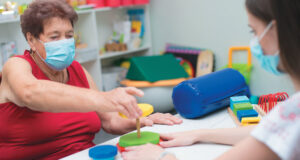
The Magic of Pediatric Nursing
BY ANGIE LABRECK, MSN, RN, CPN, ACM
Dr. Arizona Robbins (Grey’s Anatomy) said, “These are the tiny humans. These are children. They believe in magic. They play pretend. There is fairy dust in their IV bags. They hope, and they cross their fingers, and they make wishes, and that makes them more resilient than adults.” I couldn’t agree more. Pediatric nursing is wonderfully unique. We get the opportunity — no — we are encouraged to step outside the box every day with every patient. Florence Nightingale has been quoted as saying that “nursing is a fine art,” and I add that pediatric nursing is the finest of those arts.
We all know that each patient should be treated as an individual, but this is essential with pediatric nursing. As caregivers, we have to meet kids on their level. Using directed and technical language might be frightening to a toddler but comforting to an adolescent. Not turning to look when you speak to them might be concerning behavior in a 7-month-old infant but likely not surprising in a 14-year-old adolescent (at least it’s not with mine!). At my hospital, and like many others, the importance of understanding and comprehending the uniqueness of developmental stages is so well appreciated and important that we include it in our yearly education.
In my role as manager of care management at Shriners Children’s Spokane, I have the distinct privilege of working with exceptional nurses and social workers, while still getting ample opportunity to interact with my pediatric patients. I have spent nearly the entirety of my career caring for the tiny and, in some cases, not so tiny humans. Along the way, I’ve learned countless lessons, but the greatest is that the patients in the bed are not my only concern. Their grown-ups (to be referred to as the parents from this point forward for clarity’s sake but to be understood that I am using the term globally) and siblings are part of the package. The children’s illness or injury has a great and lasting impact on the whole family. So many people state they became doctors, nurses, therapists, etc., because of a medical event their sibling went through. We don’t just heal, we inspire!
The family is our greatest resource in the care of children. The parents know their children far better than we do. They help comfort, coerce participation in treatment and, at times, translate what the children are trying to tell us. I have joked with colleagues that peds would be perfect if it were not for parents, but I say that only in jest. When met with challenging parents, we must consider that in many circumstances, we may not be dealing with them on their best days. We have their greatest joy in our hands, and they are scared. It is reasonable that they can act irrationally at times. I am the mother of a child with special orthopedic needs. I know I have been “that mom” at times. We have thankfully never been in an emergent situation, but even dealing with a chronic medical condition is stressful. I have appreciated the grace shown to me, and I hope that I show the same to my patients’ families. I tell parents that when their children are given a diagnosis, they will go through a grieving process. Sometimes, they look at me funny because their child is still alive, but it’s true. They will grieve the healthy child they thought they were going to have. They will grieve the lifestyle they thought they were going to have. It does not matter what the diagnosis is; even something that the child will recover from initiates a grieving process. As caregivers, we can walk them through the process. We can provide support, understanding and compassion.
I think siblings are an often-overlooked casualty of pediatric medicine. They take a backseat to the patient. If the situation is short-term, this may be appropriate. If the patient is diagnosed with a chronic condition, it’s not just the patient’s life that is changed. The sibling(s) may take on new roles. At times, they can become stand-in caregivers themselves. They can put their needs on hold, or they can go the other direction and develop behavioral challenges to gain attention for themselves. As pediatric nurses, we can help by ensuring that all members of the family are considered in our treatment plans. Do not hesitate to stop and take a minute to ask the older sister about her day or the younger brother about his baseball game. Encourage parents to take respite time, not only for themselves but for the health of the entire family. These small acts will have big impacts.
While rewarding, pediatric nursing can also be incredibly challenging. No one likes to lose a patient, but when it is a child, the impact is greater. There is no understanding. There is no why. I have talked of treating the family as a unit, but not every child has a parent standing at their bedside. Sometimes, we must initiate the severance of the parent-child connection through calls to the authorities. Even when we know we are doing our best, we are doing our jobs, these are never easy calls to make. We must look out for and support one another. I work with an incredible group of care managers and nursing staff in both inpatient and outpatient settings. A couple of years ago, we initiated suicide screenings on all patients 10 years and older who were cognitively capable of a screening. We learned early on that repetitively asking these heavy questions and sometimes hearing tragic stories was emotionally draining on our staff. As the manager of the care management team, I tasked our social workers with regular staff check-ins. They were then able to debrief with each other and myself. We supported each other, and with time, the questionnaires became easier for staff and the regular debriefs were transitioned to as needed. Through this journey, we created a culture where everyone knows they can go to anyone when they are struggling and we will be there for one another.
Pope Francis said about nurses, “Being in contact with physicians and family members, in addition to the sick, you become, in hospitals, in healthcare facilities and in homes, the crossroads of a thousand relationships, which require attention, competence, and compassion.” In pediatric medicine, we are given the opportunity to become part of their lives, part of their family. It is a great honor and a great responsibility.

Angie LaBreck, MSN, RN, CPN, ACM, earned her BSN from Walla Walla University and her MSN, leadership & management, from WGU. She has 18 years of nursing experience and is certified in pediatrics and case management. She is the manager of care management at Shriners Children’s Spokane and is the care manager for the sports medicine program.
IMAGE CREDIT: ISTOCK.COM/FATCAMERA




